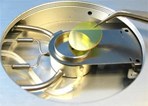The Linkam FTIR600 Stage Is Used In Combination With FTIR Spectroscopy To Image Large And Multi-Phase Samples And Monitor Fast Dynamic Processes At The University Of Rome Tre

Market leaders in temperature controlled microscopy, Linkam Scientific Instruments report on the use of their FTIR600 stage at the University of Rome Tre to visualise and measure the in-situ dehydration of silicate materials.
Geologists are interested in the distribution of volatile constituents across mineral crystals as this can provide insight into the crystallization process. This is now possible to investigate using modern FTIR imaging capabilities. On the Earth's crust, water bearing minerals are common. How these minerals dehydrate is important as this can give clues about dehydration-induced earthquakes and phase transformations at non-ambient conditions.
At the University of Rome Tre, Professor Giancarlo Della Ventura and his colleagues are using the Linkam FTIR600 stage to look at dehydration and absorption characteristics of water in various minerals. The team has demonstrated the ability to monitor the distribution of an absorber vs. time across various samples. Dehydration curves can be obtained by collecting single-spot data in situ. The band intensity of H20/OH absorption is measured at each step during the heating process and plotted against the in situ data. Professor Della Ventura said the greatest benefit of using a Linkam stage is the "possibility to perform experiments in situ, i.e. during the thermal treatment simulation."
Previously, fluid inclusions in minerals as small as 1-2µm wide have been studied using Raman spectroscopy as this had the capability to measure them. With the increased availability of synchrotron-radiation FTIR facilities and the development of FTIR imaging techniques under synchrotron and conventional light, FTIR can now be used to study these samples. FTIR spectroscopy is a very powerful tool for the high-temperature studies of volatile species. Fourier Transform Infrared Spectroscopy can be used to obtain an infrared spectrum of the absorption of a liquid, solid or gas. This infrared collection of data can be over a wide spectral range, making the FTIR an important tool in the study of minerals.
Leucite is a rock forming potassium and aluminium tectosilicate mineral with ideal composition K[AlSi2O6]. For leucite to be present, the rock must be low in silica as leucite will react with it to form feldspar. The Tre group studied the mechanism of dehydration in leucite samples from the Alban Hills and Vico volcanoes, Italy. In the first experiments, the crystal fragment was heated at 5°Cmin-1. Focal Plane Array (FPA) images were taken at 100°C intervals, using a 15x objective of the ~250x250µm2of a 190µm thick crystal fragment. By illuminating a ~170x170µm2 area of the crystal, they were able to enhance the contrast of the water band at the edge of the crystal. During the experiment, the sample dehydrates smoothly, and at 400°C, it is almost anhydrous. In a second experiment, a second crystal is heated more quickly at 50°Cmin-1 to 300°C. When the sample reaches 300°C it has lost nearly 50% of its water. At 300°C, images were taken at intervals and show the slow dehydration and after 150 min, the sample is nearly anhydrous.
This technique has been shown to provide unique opportunities to study phenomena occurring in isotropic and anisotropic materials. The use of FTIR allows for the study of areas a few µm thick and high resolution images in a very short time provides new means to study in situ, fast dynamic phenomena under non-ambient conditions. Thermal treatments, dehydration processes and many other non-equilibrium processes can now be more extensively studied in many interesting geological systems.
For more information, visit www.linkam.co.uk.
About Linkam Scientific Instruments
Linkam develops and manufactures a broad range of heating and freezing stages for both OEM and end users to visualize and explore materials properties. Used in conjunction with light microscopes and other forms of spectroscopy, Linkam stages are found in thousands of laboratories worldwide with the most successful microscope heating stage, the THMS600, selling over 4,000 units alone. Linkam is the market leader in temperature controlled microscopy.
Source: Linkam Scientific Instruments
